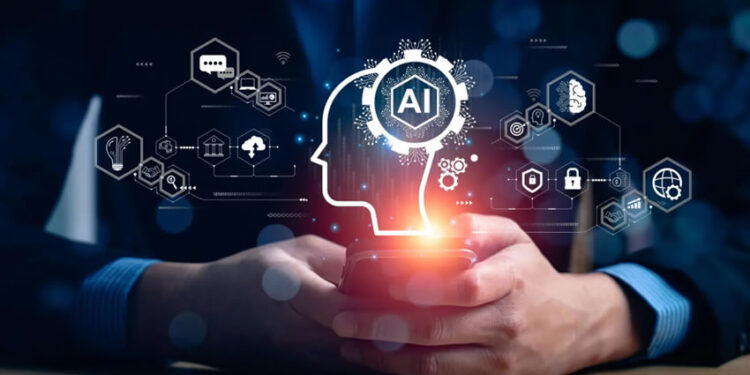Software development outsourcing is shifting toward artificial intelligence (AI). Artificial intelligence streamlines operations and improves the quality of outsourced projects by automating repetitive tasks, improving communication, and optimizing workflows. Discover how artificial intelligence influences outsourcing and dictates its future direction.
Traditional software development outsourcing is often plagued by inefficiencies in project management and team communication, as well as delivery time delays due to manual processes. Delayed timelines, increased pricing, and unequal quality are all obvious consequences, which might ultimately hinder your company’s ability to innovate and remain competitive in a fast-paced digital market. Business stakeholders and CTOs should understand the extra advantages they will get from outsourcing projects to a technology partner in the AI era.
Artificial intelligence (AI) is transforming software development outsourcing by automating monotonous tasks, enhancing team communication, and optimizing project management overall. AI-driven solutions enable the automation of testing processes, anticipate delays, and streamline operations, resulting in enhanced software quality and expedited project timelines.
Utilizing AI-driven communication tools, such as chatbots and real-time translators, your organization may enhance collaboration across worldwide teams, hence minimizing misunderstandings and increasing productivity. Organizations that use artificial intelligence in their outsourcing strategy may save expenses, minimize human error, and provide the market with more inventive concepts.
The Function of Artificial Intelligence in Software Development
Artificial intelligence in software development is not a concept of the future; it is now in use. Machine learning (ML), natural language processing (NLP), and predictive analytics, together with other AI technologies, empower developers to provide more innovative and pragmatic solutions. Artificial intelligence is substantially streamlining the software development lifecycle, from automating monotonous processes such as code generation to enhancing quality assurance testing tools.
Categories of AI Services Frequently Outsourced
Artificial intelligence-driven development tools empower programmers to produce more efficient and cleaner code. AI can predict defects or inefficiencies prior to code deployment, resulting in more reliable software for your enterprise. In DevOps, artificial intelligence facilitates continuous integration and deployment processes by identifying bottlenecks and automating testing and monitoring.
Artificial intelligence is used in application and online development services to tailor user experiences, improve decision-making skills, and provide predictive functionalities. As AI-driven chatbots gain popularity, firms may enhance user engagement by providing rapid and accurate responses to customer inquiries.
The Impact of AI on Outsourcing Software Development
Artificial intelligence is revolutionising outsourced software development management and execution. Utilizing artificial intelligence enables your organization to use automated project management solutions, enhance development monitoring, and guarantee adherence to deadlines. AI-driven communication solutions have facilitated interactions, reducing misunderstandings and enhancing client collaboration with outsourcing software development firms.
Resource allocation is another crucial domain influenced by artificial intelligence. By accurately forecasting workload and balancing operations, AI algorithms improve project completion timeliness and optimize resource use. This reduces dependence on human contact, facilitating more efficient bespoke software development services.
Artificial intelligence not only transforms traditional development but also impacts talent acquisition techniques. Your organization may use advanced algorithms to outsource web development tasks to AI-driven outsourcing firms that connect them with the most appropriate experts for their needs.
Ascendancy of Artificial Intelligence in Software Development
The capacity of artificial intelligence to transcend human limitations accounts for its ascendance in software development. One primary reason for the growing popularity of AI in the industry is its ability to process complex, extensive data sets in a fraction of the time required by humans.
As enterprises use AI-driven technology to create more intricate applications, developers utilize AI-enhanced development tools. Artificial intelligence is expanding the potential in web application development services and beyond, including automated code production and real-time performance analysis.
Moreover, artificial intelligence accelerates the movement towards automation in application development services. Development teams are seeking AI-driven testing and QA tools to automate repetitive testing tasks, therefore liberating their time to focus on novel concepts and creative solutions.
The Impact of AI on Software Development Outsourcing
In software development outsourcing, AI mostly bridges the gap between cost-effectiveness and productivity. One of the primary benefits of outsourcing is that artificial intelligence can manage routine jobs that require human intervention. Automating these activities enables enterprises to save time and resources, enabling outsourced software development companies to execute projects more swiftly and efficiently.
Artificial intelligence may provide insights that allow firms to anticipate challenges and enhance decision-making via predictive analytics. This is especially beneficial for bespoke software development services, since understanding client requirements and anticipated issues leads to superior software outcomes.
The influence of artificial intelligence is also evident in client-developer communication. Chatbots and other AI-driven communication technologies create consensus among stakeholders on the development process via continuous engagement. This mitigates the potential for misunderstanding, particularly for distant teams.
Information technology challenges: outsourcing using artificial intelligence technologies
AI presents challenges despite its exceptional potential. Data privacy and security are significant concerns for organizations, especially when using AI-driven systems that rely on extensive datasets for optimal functionality. It is imperative that AI tools adhere to security standards when outsourcing software development to external suppliers.
The implementation expenses pose an additional challenge. Smaller outsourced software development firms may see the initial investment for artificial intelligence infrastructure as substantial. Furthermore, artificial intelligence may reduce the need for human knowledge in some domains, raising concerns about job displacement within the IT outsourcing sector.
In this context, appropriate opportunity mapping and accountable AI are essential. Collaborating with an appropriate development firm will help identify the most effective and inexpensive personnel for the task, ensuring seamless adoption by workers and end users. It is essential to recognize that AI serves humanity; hence, prioritizing employee and customer experience is crucial.
The effectiveness of AI-driven technologies is largely contingent upon the quality of the data used for training. Inaccurate predictions or outcomes resulting from substandard or biased data may profoundly affect the success of web application development services and other outsourced projects. Thus, the choice of an appropriate growth partner becomes more vital. One must possess sufficient knowledge and skills to address security and quality concerns. It is essential to recognize that human intellect is paramount, especially in the context of artificial intelligence.
The Primary Benefits of Artificial Intelligence in Outsourcing Software Development
Notwithstanding these hurdles, the advantages of artificial intelligence in software development outsourcing far surpass the disadvantages. The following are several primary advantages:
#1
AI enables firms to free human resources to focus on more creative and strategic tasks by automating labor-intensive activities such as testing, debugging, and project management.
#2.
Employing AI-driven testing technologies and QA automation allows for a reduction in development cycles, accelerating product launch.
#3.
AI tools can do more thorough testing, detecting vulnerabilities and faults that human inspections may overlook. This ensures a reduction in post-launch issues and an improvement in software quality.
#4.
AI may significantly reduce costs for enterprises by minimizing human intervention in problem detection and testing, hence saving time and development expenses.
#5.
Employing AI-driven communication technologies, such as chatbots and real-time translators, facilitates efficient and error-free cooperation across offshore teams.
#6.
Predictive analytics enable firms to mitigate risks by anticipating potential delays, resource limitations, or other issues in the development process, hence enhancing ROI.
#7.
Artificial intelligence is enhancing its practical applications by rendering software more inventive and user-friendly. AI-powered chatbots provide rapid, intelligent responses to user inquiries, enhancing the client experience in online and mobile app development.
Future Trends in AI Solutions: Impacts of Software Outsourcing on IoT, Big Data Analytics, and Cybersecurity
In 2023, the IT outsourcing sector will have achieved significant success, with Gartner’s research estimating that companies involved in outsourcing spend over $4.4 trillion.
The efficacy of AI-driven systems is contingent upon the quality of the data from which they learn. Edge artificial intelligence or AI-enabled IoT devices may locally evaluate data at the edge, therefore minimizing latency and enhancing real-time decision-making. This trend accelerates the use of smart devices throughout smart cities, industries, and healthcare.
Artificial intelligence systems can predict equipment failures by analyzing IoT data, thereby increasing operational efficiency in machinery-dependent industries. Businesses may integrate predictive analytics into their infrastructure by outsourcing the development of artificial intelligence for IoT applications.
Artificial intelligence automates Internet of Things operations, enhances energy efficiency in smart residences, and streamlines supply chain management via interconnected gadgets.
Artificial intelligence and big data: AI is revolutionizing broad data analysis via the rapid and precise processing of vast quantities of data. AI-driven insights from big data assist firms in forecasting trends, optimizing strategies, and personalizing consumer experiences.
Outsourcing IT services for artificial intelligence-based data analysis enables firms to effectively handle and comprehend large data volumes without internal expertise, thereby improving decision-making and establishing competitive advantages.
Artificial intelligence facilitates real-time data analysis, enabling banking, retail, and healthcare sectors to make prompt judgments.
Artificial intelligence is essential for the immediate detection and mitigation of cybersecurity threats. It functions as a preemptive defense mechanism, detecting abnormalities and unusual patterns indicative of an attack.
Outsourcing AI cybersecurity solutions enables firms to use advanced algorithms that prevent data breaches, malware attacks, and fraud in essential sectors such as banking and e-commerce.
Artificial intelligence facilitates automated incident response, enabling systems to combat cyberattacks with little human intervention. As cybercrime evolves, these AI-driven systems become increasingly important for protecting private information.
Outsourcing AI-driven solutions for IoT, big data, and cybersecurity allows your firm to maintain competitiveness and security in an increasingly interconnected world via access to advanced technology and information.
Final Assessment
The future of outsourcing software development seems promising with the advent of artificial intelligence. As AI capabilities advance, they will become more essential for enterprises in hiring engineers, managing projects, and delivering software solutions. Businesses must, however, weigh the advantages of artificial intelligence with the challenges of data security and implementation expenses.
Clarion Technologies is at the forefront of this transformation, using artificial intelligence methodologies to enhance productivity, streamline processes, and provide high-quality bespoke software development. Organizations that use artificial intelligence will be better equipped to excel in the digital age, as it increasingly influences the trajectory of software development outsourcing.
By evaluating the advantages and disadvantages of AI in outsourcing, firms may optimize their software development endeavors and unlock unprecedented growth opportunities.




















